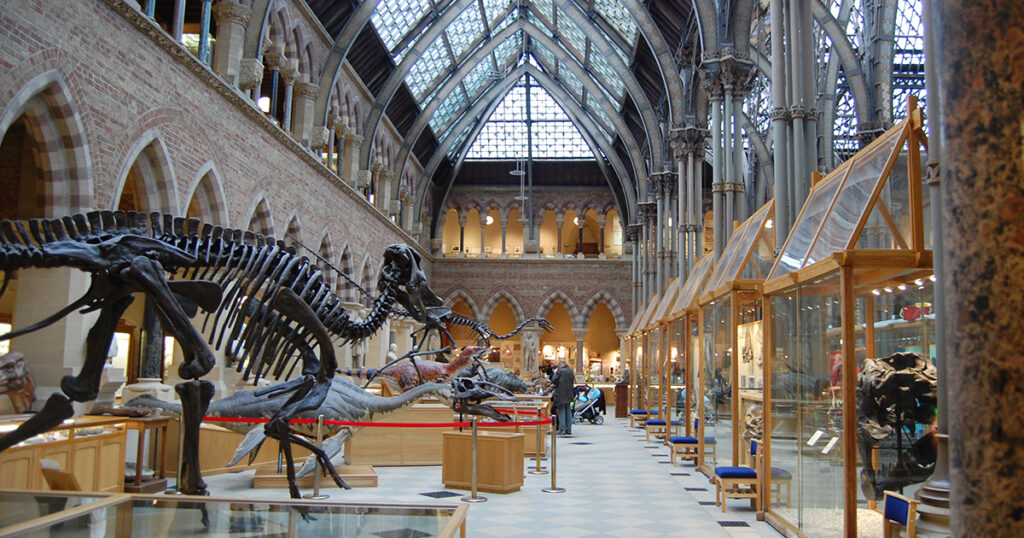
Origin Story: The Trials of Charles Darwin by Howard Markel; W. W. Norton, 368 pp., $35
In June 1860, the Oxford Natural History Museum hosted an open plenary session on a new book, The Origin of Species. Two thousand people turned up, a prizefighters’ crowd. The discussion period got seriously out of hand. The aftershocks of that day are with us still.
In Origin Story: The Trials of Charles Darwin, physician and medical historian Howard Markel portrays the two years surrounding the publication of Darwin’s dangerous text. The vital close-up is an oratorical duel between Bishop Samuel Wilberforce of the Church of England, defending Creation-based natural history, and Darwin’s stand-in, London biologist Thomas Huxley, who advocated for fact-led research. Their mythic conflict still fascinates.
Emphasis on mythic. For Markel, the showdown at the conference has become, in cultural memory, “a dangerous morass. … a demi-glace of apes, ancestry and snappy quips [that] creates a savory and syrupy version of history that we blindly follow at our peril,” thanks to “slanted histories” and, worse, the irrepressible “brigade of scientists, novelists, playwrights, screenwriters, and journalists [who] have produced carloads of books and articles, with no end in sight.”
If anyone can set them all straight, Markel’s the man—in medicine, a pediatrician; in media, a wunderkind who has churned out podcasts, columns, hundreds of articles, thousands of interviews. (He and a colleague even invented the Covid-era catchphrase “flattening the curve,” inspired by a weirdly bulging container of room-service pad thai.) Markel’s six previous popular histories map the wreckage that can result when science meets personality—Freud and his frenemies battling cocaine, the unpleasant Kellogg brothers battling each other, Watson and Crick gleefully oppressing crystallographer Rosalind Franklin in the race to understand DNA. At the University of Michigan, his alma mater, Markel holds appointments in history, history of medicine, psychiatry, pediatrics and communicable diseases, and health management and policy. (Language and literature, too, since he co-teaches a course in literature and medicine; Markel in his youth was an English major who loved comedy and show business and yearned to become a playwright.)
Origin Stories promises not one mystery but two. Darwin is the most famous sick scientist ever, but the reason for his strange medical ordeals has eluded researchers and clinicians for well over a century. In an all-too-brief chapter, Markel reviews the case, then makes a determination: “This physician believes Darwin most likely suffered from systemic lactose intolerance. The diagnosis, however, must be credited to a team of biochemists from Cardiff and a gastrointestinal pathologist and a historian of science from Leeds.” But his irritable dismissal of other answers feels like attending grand rounds with a celebrated expert who only skimmed the chart.
Darwin’s other trial wasn’t a trial at all. On that crucial summer day in Oxford, there was no debate per se, the word evolution never came up, and Huxley’s famous retort—that he would prefer to be descended from a miserable ape than a corrupt bishop—was barely heard in the uproar, if, indeed, he even said it. “Alas, the physiological quirks of memory, literary embellishments, and bibliographical idiosyncrasies have left us with a blurred picture of a brief encounter,” Markel declares. “We are forced—as Eartha Kitt once warbled in what might serve as the siren song for diviners of the past—to ‘proceed with caution, but, lover, please proceed.’ ”
Among the rewards of Origin Story are its reconstructions. Markel offers both a natural history of Darwin’s 150,000-word technical treatise and a tutorial in recovered evidence. He is very good on the backstage politics of Victorian science, especially the daring of Darwin’s canny handlers, Huxley (soon to be known as “Darwin’s bulldog”) and botanist Joseph Hooker. He also plays the insult comic, and indulges in you-are-there prose, sometimes simultaneously: “Thousands of eyes watched as the Bishop of Oxford shifted his bulky haunches from side to side on a hard chair—perhaps so that he might majestically turn the other cheek.” Or: “Then again, it is amusing to imagine how ardently [Emma Darwin] must have prayed for her husband’s soul.”
Markel seems to sympathize more with Huxley the sharp-elbowed showman (“a scientist with a huge chip on his shoulder and the gift of gab”) than with Darwin the procrastinating, neurotic trust-funder. Yet as Stephen Jay Gould noted, Darwin was radical in his scientific ideas, liberal in his political and social views, and conservative in personal lifestyle, and the tension between his heritage as a gentleman and his honor as a naturalist was profound, and agonizing. Years before the Oxford rumble, he wrote to Hooker, “I am almost convinced (quite contrary to opinion I started with) that species are not (it is like confessing a murder) immutable.”
Origin Story is a midlist addition to the Markel canon. Those new to his work might first try The Kelloggs (2017), a lively, groundbreaking origin tale for the American wellness industry. Darwinology is boggy ground, still mapped best by Janet Browne of Harvard, whose magisterial two-volume life (Voyaging and The Power of Place) remains unsurpassed. Her landmark 2022 essay in the Journal of the History of Biology, “Reflections on Darwin Historiography,” lucidly explains what Markel skips: the ways Darwin studies have become decolonized and decentered, moving away from great-man history to broader pictures of the social and intellectual movements that shaped him, and vice versa.
Since 1885, the name Charles Darwin has appeared in the title of some 1,026 books, in myriad languages. A twice-told tale, done well, can be its own pleasure, and Origin Story is the good-parts, biopic version of Darwin’s earliest appointment with immortality. Fate, chance, destiny, inheritance, selection, adaptation: the retelling is all, and so, sometimes, is the second opinion.


